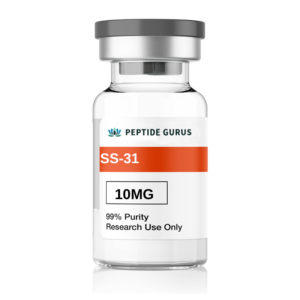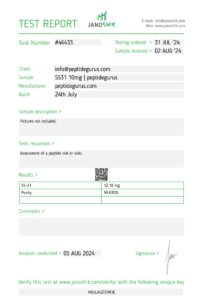Heart health is a crucial aspect of overall well – being, and medical research is constantly exploring new ways to prevent and treat heart – related conditions. The SS – 31 peptide, also known as Elamipretide, has emerged as a promising molecule in the field of cardiovascular research. This article will delve into the role of the SS – 31 peptide in heart health, its mechanism of action, research findings, and how it aligns with FDA guidelines.
The SS – 31 peptide has a sequence of D – Arg – Tyr(2,6 – diMe) – Lys – Phe. Its molecular formula is C32H49N9O5, with a molecular weight of 639.8 g/mol. It is a small, aromatic peptide that can easily penetrate cell and organelle membranes. This unique property allows it to reach the mitochondria, the powerhouses of the cell, where it exerts its beneficial effects.
SS – 31 primarily acts on the mitochondria. It stabilizes cardiolipin, a key component of the inner mitochondrial membrane. Cardiolipin is essential for the proper functioning of the electron transport chain, which is responsible for generating adenosine triphosphate (ATP), the cell’s energy currency. By stabilizing cardiolipin, SS – 31 promotes efficient energy production in cells.
In addition to its effect on cardiolipin, SS – 31 also reduces the production of reactive oxygen species (ROS), or free radicals. Excessive ROS can cause oxidative stress, which is harmful to cells and is linked to many heart – related diseases. By minimizing oxidative stress, SS – 31 helps protect heart cells from damage.
Heart failure is a serious condition where the heart is unable to pump blood effectively. Research has shown that SS – 31 can play a significant role in treating heart failure. In human heart tissue treated with SS – 31, there are significant improvements in mitochondrial oxygen flux and the activity of components involved in ATP production.
Studies in dogs with advanced heart failure have found that chronic treatment with SS – 31 can improve left ventricular function. Measures of mitochondrial respiration and maximum ATP synthesis were correlated with the overall improvement in left ventricular function. This suggests that SS – 31 could be an effective long – term treatment for improving energy dynamics and reducing cardiac remodeling in advanced heart failure.
During a heart attack, also known as ST – segment elevation myocardial infarction, heart muscle cells are damaged due to a lack of oxygen. Trials exploring the use of SS – 31 in this context have found that the peptide can drastically reduce levels of HtrA2, a marker of cardiomyocyte apoptosis (cell death). This indicates that SS – 31 may be useful in reducing the extent of injury and preserving cardiac tissue during an acute heart attack.
SS – 31’s ability to reduce oxidative stress and improve mitochondrial function also provides general cardiac protection. By maintaining healthy mitochondrial function, it helps the heart withstand various stressors, such as ischemia (lack of blood supply) and reperfusion (restoration of blood flow after ischemia), which can cause damage to heart cells.
Pre – clinical studies on animals, such as rats and mice, have provided valuable insights into the potential of SS – 31 for heart health. For example, in rats with kidney ischemia – reperfusion injury (which can also mimic some aspects of heart – related mitochondrial stress), SS – 31 protected kidney structure, accelerated ATP production recovery, and reduced cell death.
In clinical trials, while the initial phase III trials did not produce conclusive evidence of SS – 31’s clinical utility, phase II trials showed promising results. In humans, SS – 31 increased exercise performance after just 5 days of treatment and had no significant safety concerns or side effects. Currently, there are ongoing phase II trials and planned phase III trials to further evaluate SS – 31 in different heart – related disease states with various outcome measures.
As of now, the FDA has not fully approved SS – 31 for widespread use in treating heart – related conditions. However, the FDA has a set of guidelines for the development and approval of new drugs and biologics. For SS – 31 to gain full approval, it must meet strict safety and efficacy standards.
The FDA requires extensive pre – clinical and clinical studies. Pre – clinical studies should demonstrate the peptide’s safety and potential efficacy in animal models. Clinical trials, which typically follow a three – phase process, must show that SS – 31 is both safe and effective in humans. The manufacturing process of SS – 31 also needs to adhere to Good Manufacturing Practice (GMP) regulations to ensure the quality and consistency of the product.
Answer: No, you should not take SS – 31 without medical supervision. Currently, it is still being studied in clinical trials, and its use outside of a medical setting is not recommended. Self – administration can be dangerous as the proper dosage, potential side effects, and interactions with other medications are still being fully explored.
Answer: In clinical trials, SS – 31 is generally well – tolerated. Some people may experience mild reactions like redness or swelling at the injection site. More severe side effects are rare, but it’s important to note that since it’s still under study, there may be unknown side effects. A healthcare professional should monitor you if you are using SS – 31.
Answer: It’s difficult to say for sure. While SS – 31 shows promise, it still needs to complete more clinical trials and meet FDA approval requirements. If future trials are successful, it may become more widely available in the coming years, but there is no definite timeline at present.

